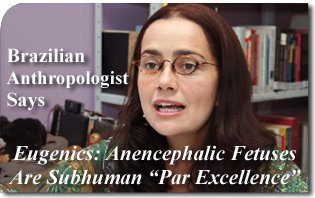 A well-known Brazilian pro-abortion activist and anthropologist Debora Diniz (photo) once wrote an article defending “selective pregnancy interruption (SPI)” that is, the murdering of babies with grave physical deficiencies. Her article gives the sinister reasons behind the struggle to de-criminalize this type of abortion.1
A well-known Brazilian pro-abortion activist and anthropologist Debora Diniz (photo) once wrote an article defending “selective pregnancy interruption (SPI)” that is, the murdering of babies with grave physical deficiencies. Her article gives the sinister reasons behind the struggle to de-criminalize this type of abortion.1
In a pedantic text in Brazilian Portuguese, Diniz states:
“First of all, anencephaly maintains its dominance among pathological conditions for its extreme clinical nature: the absence of the brain’s hemispheres. But in my view, this is not the one sufficient reason to turn anencephalic fetuses into metaphors of the movement to legitimize selective abortion.”
Why? Because the so-called “selective abortion” is intended not only for anencephalic babies but for all those who abortionists define as subhuman. Diniz continues:
“The absence of the brain’s hemispheres, or in common language the ‘absence of a brain’ makes the anencephalic fetus a representation of the subhuman par excellence.”
By inferring that the anencephalic baby is subhuman “par excellence,” it is clear that there are presumably other “not so excellent” forms of “subhumanity.” Who are these subhumans? The noted activist explains:
“Subhumans are those who, according to the dictionary, are below the human level. Or, as Jacquard prefers, they are those inept to share ‘humaneness,’ the culture of human beings. Thus, anencephalic fetuses are some among the subhumans—those who failed to attain the minimum level of biological development required to enter humaneness…”
To make her point, Debora Diniz quotes the opinion of a noted progressivist priest:
“Fernando Altemeyer Junior, auxiliary pastor for Communications at the Archdiocese of São Paulo, in an article published in Jornal do Brasil on April 1, 1996, which said this about selective abortion in cases of anencephaly: ‘…Many renowned Catholic moralists have taken a stand in favor of this surgery in the specific case of anencephaly, for the fruits of this pregnancy are not human and therefore one cannot require the mother to accept the sacrifice of a pregnancy unable to give human life to a child destined to survive…’”
The anthropologist continues:
“Subhumans are those whose lives are bound to ‘fail’—as Dworkin, a liberal American jurist who studies abortion, explains—or those for whom, to say the least, the concept of life is inadequate. Subhumans are extreme human otherness, those not expected by the miracle of procreation.”
Even the handicapped would not escape “selective abortion”:
“… There is much greater life expectancy and that is precisely what unites an anencephalic fetus to one carrying a trisomy of chromosome twenty-one [Down Syndrome] and even fetuses lacking distal limbs as potential targets of SPI [selective pregnancy interruption]. It is a social idea of life backed, of course, by biological fullness, which justifies most requests for selective abortion.”
On reading such statements, how can one not think of eugenics—favored and “justified” during the Nazi dictatorship, though still not presently mandatory?
As society increasingly loses its Christian roots to a wave of paganization, there are all sorts of ideas that clash with the lofty virtues of justice and charity toward our deficient neighbors and we are gradually nudged toward a pseudo-scientific and Darwinist dictatorship in which only those whom the State deems “perfect” will have a right to life.
Footnotes
- Article is taken from the Brazilian pro-life site: Campanha Nascer é um Direito, Associação dos Fundadores, São Paulo, Brasil at http://www.fundadores.org.br/AbortoNao/principal.asp?IdTexto=1300&pag=1&categ=1.
